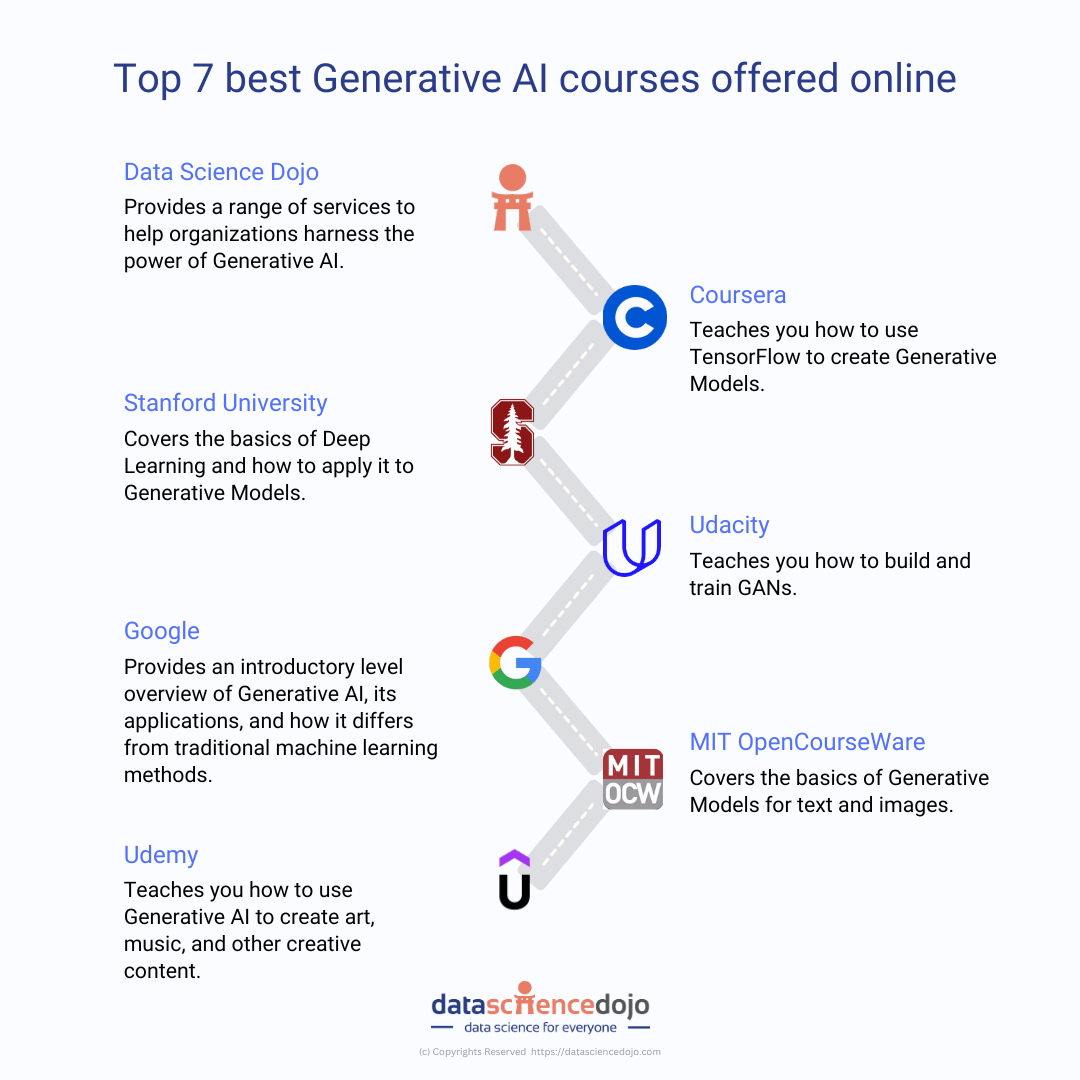Generative AI is a rapidly growing field with applications in a wide range of industries, from healthcare to entertainment. Many great online courses are available if you’re interested in learning more about this exciting technology.
The groundbreaking advancements in Generative AI, particularly through OpenAI, have revolutionized various industries, compelling businesses and organizations to adapt to this transformative technology. Generative AI offers unparalleled capabilities to unlock valuable insights, automate processes, and generate personalized experiences that drive business growth.
Here are seven of the best generative AI courses offered online:

1. Large Language Models Bootcamp by Data Science Dojo

Data Science Dojo provides a range of services to help organizations harness the power of Generative AI. Our expertise and experience enable us to offer tailored solutions that align with your unique requirements and objectives.
What is covered in the Large Language Models Bootcamp:
Here are some of the things you will learn in the Large Language Models Bootcamp from Data Science Dojo:
- Introduction to Generative AI: You will learn about the basics of generative AI, including the different types of generative models, how they work, and how they are used.
- Types of Generative AI Models: You will learn about the different types of generative AI models, including text-based models, image-based models, and diffusion models.
- Foundation Models & LLMS: You will learn about the foundation models and LLMs that are used to power generative AI applications.
- Intro to Image Generation: You will learn about the different techniques that are used to generate images, including image captioning models and diffusion models.
- Generative AI Applications: You will learn about the different applications of generative AI, including chatbots, text generation, and image generation.
- Evolution of Classical Text Analytics Techniques: You will learn about the different text analytics techniques that have been developed over time, including encoding, N-grams, and semantic encoding.
- Machine Learning Models for NLP: You will learn about the different machine learning models that can be used for natural language processing (NLP) tasks, such as text classification and sentiment analysis.
- Introduction to LLMs: You will learn about the different types of LLMs, how they work, and how they can be used for a variety of tasks, such as text generation, question answering, and summarization.
- Leveraging Text Embeddings for Semantic Search: You will learn about how text embeddings can be used to create semantic search engines that can understand the meaning of text and return relevant results.
- Application of Semantic Search: You will learn about the different ways that semantic search can be used, such as for finding information on the web, filtering spam emails, and improving chatbots.
- Prompt Engineering and Text Generation: You will learn about how to use prompt engineering to control the output of LLMs and generate text that is tailored to specific requirements.
- Customizing Foundation LLMs: You will learn how to customize foundation LLMs by fine-tuning them for specific tasks.
- Orchestration Frameworks to Build Applications on Enterprise Data: You will learn about the different orchestration frameworks that can be used to build applications that use LLMs.
- Building LLM Applications Using LangChain: You will learn how to build LLM applications using the LangChain framework.
- Loading, transforming and indexing data for LLM applications: You will learn how to load, transform, and index data for LLM applications.
- End to End App with LLM and LangChain: You will learn how to build an end-to-end application that uses LLMs and LangChain.
The Large Language Models Bootcamp from Data Science Dojo is a comprehensive course that will teach you everything you need to know about LLMs. The course is taught by experienced instructors who are experts in the field of NLP. The course is also hands-on, so you will have the opportunity to apply what you learn to real-world problems.
If you are interested in learning about LLMs, then the Large Language Models Bootcamp from Data Science Dojo is a great option for you
Learn more about: Top large language models bootcamp you should know about
2. Generative AI with TensorFlow:

This course from Coursera teaches you how to use TensorFlow to create generative models. You’ll learn about diverse types of generative models, such as GANs and VAEs, and how to train them.
Check out the course here —> Generative AI with TensorFlow
Lessons:
- Introduction to Generative AI
- Generative Adversarial Networks (GANs)
- Variational Autoencoders (VAEs)
- Training Generative Models
- Applications of Generative AI
Core features:
- Lectures by top experts in the field
- Hands-on exercises to help you learn by doing
- A supportive community of learners
Pricing:
- The course is available for free on Coursera.org. However, you can also choose to pay for a verified certificate of completion.
3. Deep Learning for Generative Models:
This course from Stanford University covers the basics of deep learning and how to apply it to generative models. You’ll learn about different types of deep learning architectures, such as CNNs and RNNs, and how to use them to create generative models.
Check out the course details here —-> Deep Learning for Generative Models
Lessons:
- Introduction to Deep Learning
- Convolutional Neural Networks (CNNs)
- Recurrent Neural Networks (RNNs)
- Generative Deep Learning Models
- Applications of Generative Deep Learning
Core features:
- Lectures by top experts in the field
- Hands-on exercises to help you learn by doing
- A supportive community of learners
Pricing:
- The course is available for free on Stanford Online. However, you can also choose to pay for a verified certificate of completion.
4. Generative Adversarial Networks:

This course from Udacity teaches you how to build and train GANs. You’ll learn about the different components of GANs, such as the generator and the discriminator, and how to train them to generate realistic images, text, and other data.
Check out the course details here —> Generative Adversarial Networks
Lessons:
- Introduction to GANs
- The Generator
- The Discriminator
- Training GANs
- Applications of GANs
Core features:
- Lectures by top experts in the field
- Hands-on exercises to help you learn by doing
- A supportive community of learners
Pricing:
- The course is available for free on Udacity. However, you can also choose to pay for a Nanodegree program.
5. Generative Models for text and images:

This course from MIT OpenCourseWare covers the basics of generative models for text and images. You’ll learn about different types of generative models, such as RNNs and CNNs, and how to use them to generate realistic text and images.
Check out the course details here —> Generative Models for text and images
Lessons:
- Introduction to Generative Models
- Recurrent Neural Networks (RNNs)
- Convolutional Neural Networks (CNNs)
- Generating Text with RNNs
- Generating Images with CNNs
Core features:
- Lectures by top experts in the field
- Hands-on exercises to help you learn by doing
- A supportive community of learners
Pricing:
- The course is available for free on MIT OpenCourseWare.
6. Generative AI courses by Google

Introduction to Generative AI course: This course by Google is a free microlearning course that provides an introductory level overview of Generative AI, its applications, and how it differs from traditional machine learning methods. The course also covers Google Tools that can help participants develop their own Generative AI applications. The estimated completion time for this course is approximately 45 minutes.
Upon completion of the course, participants can earn a badge that represents their achievement. Badges can be viewed on the profile page and shared with their social network, showcasing the skills they have developed in the field of Generative AI.
Generative AI learning path: This learning path provides a curated collection of content on generative AI products and technologies, starting from the fundamentals of Large Language Models to creating and deploying generative AI solutions on Google Cloud. It is managed by Google Cloud and consists of 10 learning activities.
Generative AI Fundamentals: Finally, this course is offered as part of the Google Cloud Skills Boost program. To earn a skill badge in Generative AI, participants need to complete the Introduction to Generative AI course along with two other courses:
Introduction to Large Language Models (LLM) and Introduction to Responsible AI. By passing the final quiz, participants can demonstrate their understanding of foundational concepts in generative AI and earn the skill badge
Check out all the course details here —> Generative AI courses by Google
7. Generative AI for Creative Applications

This course from Udemy teaches you how to use generative AI to create art, music, and other creative content. You’ll learn about several types of Generative AI models, such as GANs and VAEs, and how to use them to create your own unique pieces of art.
Check out the course details here —> Generative AI for Creative Applications
Lessons:
- Introduction to Generative AI for Creative Applications
- Generative Adversarial Networks (GANs)
- Variational Autoencoders (VAEs)
- Creating Art with GANs
- Creating Music with VAEs
Core Features:
- Lectures by top experts in the field
- Hands-on exercises to help you learn by doing
- A supportive community of learners
Pricing:
- The course is available for $19.99 on Udemy.
Conclusion
I hope this blog post has helped you learn more about the top 7 best generative AI courses offered online. If you’re interested in learning more about this exciting technology, I encourage you to check out one of these courses.
Generative AI is a rapidly growing field with a wide range of applications. If you’re interested in learning more about this exciting technology, I encourage you to check out one of the many great online courses available.
With so many options to choose from, you’re sure to find the perfect course to help you learn more about generative AI and how to use it to create your own unique applications.
Check out the details of Large Language Models Bootcamp by Data Science Dojo here:








